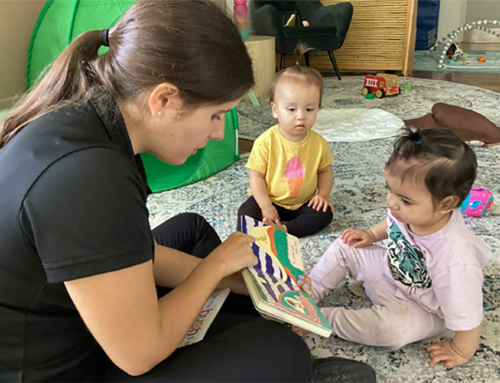Just like adults, many children have trouble falling asleep or staying asleep at night. Some children are too restless at night to settle down enough to fall asleep. Others may fall asleep easily, but seem to wake up at the slightest noise. Others may experience difficulty sleeping with a babysitter.
Sleep is crucial to your child’s development. In fact, most children require 10 to 11 hours of sleep each night (though individual needs may vary from child to child).
A restful night’s sleep is crucial to your child’s development, and can:
- Promote healthy growth
- Reduce the risk of infection and illness
- Improve cognitive abilities
- Maintain healthy bodily functions
- Increase attention span
- And so much more!
If your child struggles to get a good night’s sleep, how can you help? Here are 7 techniques to help your child sleep better at night.
1. Establish a consistent bedtime routine
Creating bedtime habits establishes a consistent routine for your child to perform each night. Initiating a bedtime routine signals to your child’s brain that it is time to get ready to go to sleep, and encourages the mind and body to settle in for bedtime.
One of the most important aspects of a beneficial nightly routine is to send your child to bed at approximately the same time every night. Having a consistent bedtime helps to send a physical, habitual signal to your child’s body that it is time to settle in for the night. This will also help you to structure evening activities around your child’s bedtime.
Nighttime routines can incorporate a number of other elements that can help your child fall asleep, and the “right” elements vary from child to child. Many parents swear by playing music softly in the background, using a night light, or sleeping with a favourite blanket or stuffed animal, to name a few. Whatever you choose, keeping the routine consistent from night to night is the most important aspect.
2. Monitor evening eating habits
What and when your child eats at night can impact their ability to fall asleep. Be sure to schedule dinner several hours in advance of bedtime, as eating a large meal close to bedtime can make it harder for your child to fall asleep.
If they get hungry before it is time to go to sleep, then it’s fine to give them a snack. However you should try to avoid foods high in sugar content. This includes fruit! Instead, try foods that have both protein and carbohydrates, as these are the foods that will encourage the formation of the chemicals in the body that promote sleep.
3. Set aside time for a bedtime story
Reading or listening to stories does more than help your child learn and stretch their imagination; it is also a tried-and-true way to prepare them to fall asleep at night. Whether they are reading a book on their own or listening to you recite one of their favourite tales, a story helps to put your child in a relaxing frame of mind.

When your child is younger, either unable to read yet or just learning, reading a bedtime story to them will provide a way to keep their mind engaged so that they do not feel the urge to run around and find that stimulation elsewhere in a less restful way.
They will be wrapped up in a blanket, warm and comfortable, and can even drift off in the middle of the story when they are tired enough to fall asleep. Incorporating story time into their bedtime routine at an early age will encourage your child to continue the habit as they gets older, reading on their own as they learn to read well enough to do so.
Other physically passive activities, such as listening to music, could also help them to unwind before falling asleep.
4. Avoid “screen time”
An ever increasing number of scientific studies indicate that the light generated by computers, phones, and tablets inhibits the production of melatonin. Melatonin is a naturally-occurring chemical in the body that promotes sleep.
Allowing your child to use electronic devices before bed can both prevent them from feeling sleepy and increase the amount of time that it takes them to fall asleep. What’s more, even after they fall asleep they are likely to experience shorter REM sleep cycles than a child who does not use screens before bedtime. This means that in addition to – and because of – the decrease in both the amount and quality of their sleep, your child is less likely to be able to focus during the day and may feel sluggish or lethargic.
Rather than allowing your child to use an iPad or watch TV at the end of the day, try to steer them towards reading a book, doing a puzzle, playing a board game, or another non-electronic activity. Sedentary activities will be more productive in terms of helping them to settle down at night, but anything that limits the use of screen time will help.
5. Use a Sound Machine
If your child is highly alert or a light sleeper, seemingly insignificant noises may be enough to catch their attention and prevent them from falling asleep at night. Incorporating a noise machine can help to drown out background noise, providing a consistent backdrop of sound that can encourage your child to fall asleep. While they are sleeping, the noise machine will also help to muffle noises that might jolt them awake if they are a particularly light sleeper.
Noise machines are made with a variety of sounds, from ocean waves to rainforests to even something as simple as white noise. Play with the volume to see what works best for your child. Some prefer softer noises simply to alleviate minor background noises, while others may prefer a higher volume.
6. Keep the Lights Off
Studies also show that light pollution of any kind, not just from light-emitting screens, can disrupt your child’s sleep patterns. Sleeping in complete darkness promotes the healthiest sleep cycles, which in turn increases the benefits that a good night’s sleep can provide.
Utilising blackout curtains is a good place to start. For light sleepers, blackout curtains can reduce the likelihood that fluctuations of outdoor light, including bright moonlight or motion-activated floodlights, will wake your child in the night. Eliminating common sources of light such as bright clock faces and even night lights can go a long way.
If your child is afraid of the dark, they may want to sleep with a night light. If this is the case, you could try leaving a night light in the hallway and turning it off after they fall asleep, leaving just enough light to be comfortable but not so much that it keeps them awake. You could also utilise a night light that turns off automatically after a certain amount of time.
7. Encourage Your Child to Self-Soothe
As your child gets older, try to avoid rushing to their bedside when they wake up during the night. If your child learns to fall back asleep on their own, then they will be less likely to need prolonged attention to do so in the future.

As your child gets older, consider discontinuing the use of a video-feed crib monitor in order to lessen the urge to check on them constantly throughout the night.
If you choose to continue using a radio monitor, consider turning down the volume so that you are only driven to comfort your child when they are particularly distressed. This will encourage them to learn to fall back asleep on their own at an early age.
If you are the parent of an older child, you can encourage self-sufficiency throughout the night by asking them before they go to bed if they have everything that they need. If they wake in the night from a nightmare and crawl into bed with you, make sure that they fall back asleep in their own bed.
Some children may find additional comfort if you assure them that you will be listening until they can fall back asleep; just knowing that you are there can reduce feelings of tension or anxiety.
The more accustomed your child is to falling back asleep without your help, the easier it will be for them to do so in the future.
Final Thoughts:
Healthy, consistent sleeping patterns are the key to a child’s growth and success. Each child is different and not every strategy will work well with your young ones, but there is always something that can be done to help your kids establish peaceful sleeping habits.
Helping your child to sleep through the night is crucial to their development and happiness – as well as your own!
To learn more about how Petit can help your children form other great habits, book a tour today.






